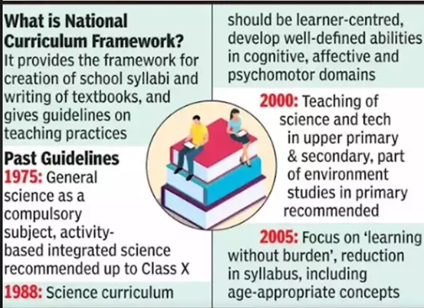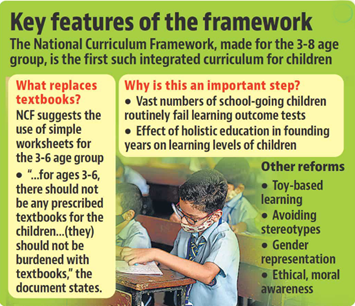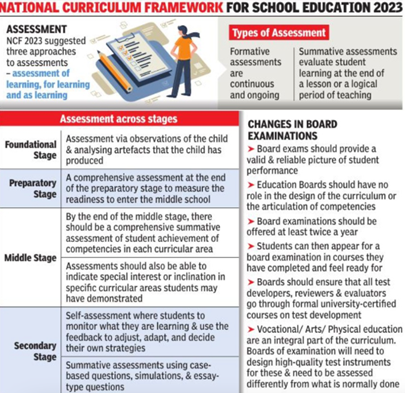Cultivate Values for Meaningful Education
Relevance
- GS Paper 2 Government Policies and Interventions for Development in various sectors and Issues arising out of their Design and Implementation.
- Tags: # NationalCurriculumFrameworkforSchoolEducation #Values #MintEditorial #UPSCMains2024 #UPSCPrelims2024 #UPSC #Education.
Why in the News?
The National Curriculum Framework for School Education 2023 (NCF) emphasizes the importance of instilling values in students. It articulates five ‘Aims of Education’ and discusses ethical, democratic, and epistemic values and dispositions that should be developed.
Aims of Education: Values and Morals
The National Curriculum Framework for School Education 2023 outlines five “Aims of Education”.
- Rational thought.
- Health.
- Democratic engagement.
- Economic participation.
- Cultural engagement.
These principles guide the development of knowledge, skills, and values in students, fostering a holistic education.
Fostering Core Values for Education
To achieve the five aims of education, values are categorized into three key areas.
- Ethical and Moral Values: These include qualities like empathy, sensitivity, integrity, and courage, fostering personal and societal well-being.
- Democratic Values: This category includes a dedication to liberty, equality, embracing diversity, nurturing a fraternal spirit, and embracing social responsibility, promoting democratic ideals.
- Epistemic Values: These values focus on knowledge and truth, encouraging scientific temper and recognizing sources of knowledge across different domains, nurturing a spirit of intellectual inquiry and curiosity.
NCF’s Holistic Educational Approach
- The National Curriculum Framework (NCF) emphasizes the cultivation of specific Qualities in students, including a positive work ethic, curiosity, and global citizenship while preserving their Indian identity.
- It promotes an integrated approach for educational institutions and the curriculum.
- This involves integrating the development of attitudes and behaviors into learning standards and procedures for all academic levels and topics, taking into account content, pedagogy, and evaluation.
Values through Real-Life Experiences
- Real-Life Learning: Values are best absorbed when students experience them in real-life This practical exposure is vital for meaningful value education.
- School Culture’s Role: Sustaining a school culture that embodies these values is crucial. It involves treating parents respectfully, being inclusive to students with varying abilities, and fostering strong relationships among staff.
- Age-Appropriate Approach: Recognizing that children of different ages respond differently to values education is essential.
- Younger children often follow role models, while older ones engage in reasoning and reflection.
- Tailoring approaches to specific age groups is key to effective value education.
Curricular Impact on Values
- Classroom Discussions: Regular discussions can nurture democratic values, rational thinking, and sensitivity among students.
- Sports: Participation in sports fosters virtues like endurance, honesty, and courage.
- Academic Subjects: Subjects like social science, science, and mathematics contribute to the development of epistemic values in learners.
Content’s Impact on Values
- Implicit and Explicit Influence: Curricular content shapes values both implicitly and explicitly. Stories or historical narratives that celebrate pluralism, equality, and justice contribute to value education.
- Implicit Choices: Even subtle choices in content, like the portrayal of individuals or illustrations in textbooks, can affect values.
- Constitution Discussions: Incorporating discussions on the Indian Constitution, covering concepts like equality, liberty, fraternity, and fundamental duties, is integral to the educational process.
Value-Centric Education in Grade 9
- Moral and Ethical Reasoning Course: Grade 9 introduces a mandatory course on moral and ethical reasoning for all students, emphasizing value education.
- Subject-Specific Values: Curricula require schools to identify and address specific values directly in subjects like social science, connecting rights and duties or language and empathy.
- Teacher Training and Engaging Materials: Teachers need training, along with engaging and non-pedantic teaching materials tailored for value-based education.
Managing Conflicting Values
- Real-World Conflicts: Some values taught in school might not be followed outside. For instance, schools teach equality, but communities may discriminate based on gender, caste, etc.
- The NCF acknowledges that there are no simple solutions to these conflicts because they’re complex.
- Instead of quick fixes, the NCF suggests fostering dialogue and empathetic behavior to address these conflicts.
- It’s about being understanding and talking things through in a thoughtful way to help students learn how to handle such situations.
Developing Values: School and Community Responsibility
- Collective Responsibility: Schools and communities share the responsibility of nurturing values and dispositions in students.
- Non-Judgmental Assessment: Assessing individual students’ values should be non-judgmental, focusing on observable behavior. Practical observations, like “helps other students,” are more educationally valuable than abstract terms like “empathy” or “sensitivity.”
- Impact of Educators and System: The values held by teachers, principals, and the education system profoundly influence students. The educational culture must align with the values expected from students.
The NCF recognizes that instilling values is one of the education system’s greatest challenges, emphasizing the need to make earnest efforts, as sound values are integral to meaningful education.
|
National Curriculum Framework
|
Source: Livemint
Mains Question
Discuss the five ‘Aims of Education’ outlined in the National Curriculum Framework for School Education 2023 (NCF) and their significance in shaping the curriculum and educational values.






